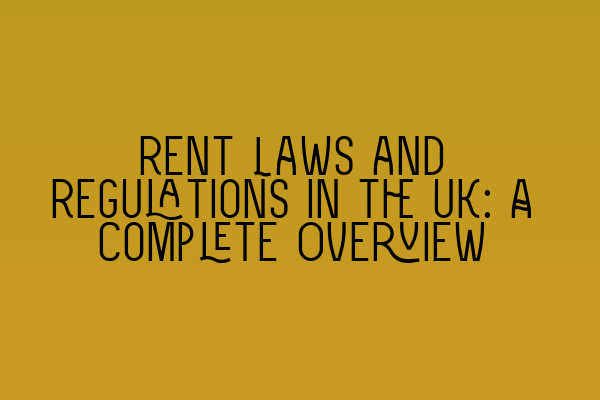Rent Laws and Regulations in the UK: A Complete Overview
Introduction
When it comes to renting property in the UK, both landlords and tenants need to be aware of the various laws and regulations that govern the rental market. Understanding these laws is crucial for both parties to ensure a fair and legal rental agreement. In this comprehensive guide, we will provide you with a complete overview of the rent laws and regulations in the UK.
1. The Housing Act 1988
The Housing Act 1988 is a key piece of legislation that regulates most private residential tenancies in England and Wales. It introduced two types of tenancies: Assured Shorthold Tenancies (ASTs) and Rent Act Tenancies. ASTs are the most common type of tenancy and provide landlords with more flexibility for repossessing their property.
2. Security of Tenure
Under the Housing Act 1988, tenants have certain rights and protections when it comes to security of tenure. This means that they have the right to live in the property for a specific period of time, as long as they adhere to the terms of the tenancy agreement. However, landlords can still regain possession of their property under certain circumstances, such as when they need the property for themselves or their family.
3. Rent Increases
Landlords have the right to increase the rent during a tenancy but there are restrictions on how and when they can do so. In most cases, landlords must give at least one month’s notice before raising the rent, and there are limits on how much the rent can be increased. These limits are set by the Rent Officer or Rent Assessment Committee, depending on the location of the property.
4. Deposit Protection
Landlords in the UK are required by law to protect their tenants’ deposits in a government-approved tenancy deposit protection scheme. These schemes ensure that tenants can get their deposit back at the end of the tenancy, provided they meet the terms of the agreement and do not cause any damage to the property. Failure to protect a tenant’s deposit can result in severe penalties for landlords.
5. Repairs and Maintenance
Landlords have a legal obligation to ensure that the property is safe and in good repair throughout the tenancy. This includes maintaining the structure of the building, as well as providing necessary amenities such as heating, hot water, and ventilation. Tenants should report any repairs or maintenance issues to their landlord as soon as possible, and landlords should address these concerns in a timely manner.
6. Eviction Process
If a landlord wants to evict a tenant, they must follow the proper legal process. This usually involves serving a notice to the tenant, giving them a specific amount of time to vacate the property. If the tenant does not leave voluntarily, the landlord can apply to the court for a possession order. It’s important for both landlords and tenants to understand the eviction process to ensure that their rights are protected.
Conclusion
Navigating the rent laws and regulations in the UK can be complex, but it’s essential for both landlords and tenants to understand their rights and responsibilities. By familiarizing yourself with the Housing Act 1988, security of tenure, rent increases, deposit protection, repairs and maintenance, and the eviction process, you can ensure a fair and legal rental agreement.
For more information on the SQE exams and how to prepare for them, check out our related articles:
– SQE 1 Practice Exam Questions
– SQE 1 Practice Mocks FLK1 FLK2
– SQE 2 Preparation Courses
– SQE 1 Preparation Courses
– SRA SQE Exam Dates
Remember, if you need assistance with any legal matters related to property law and land law, contact SQE Property Law & Land Law, your trusted solicitors specializing in property law in the UK.
